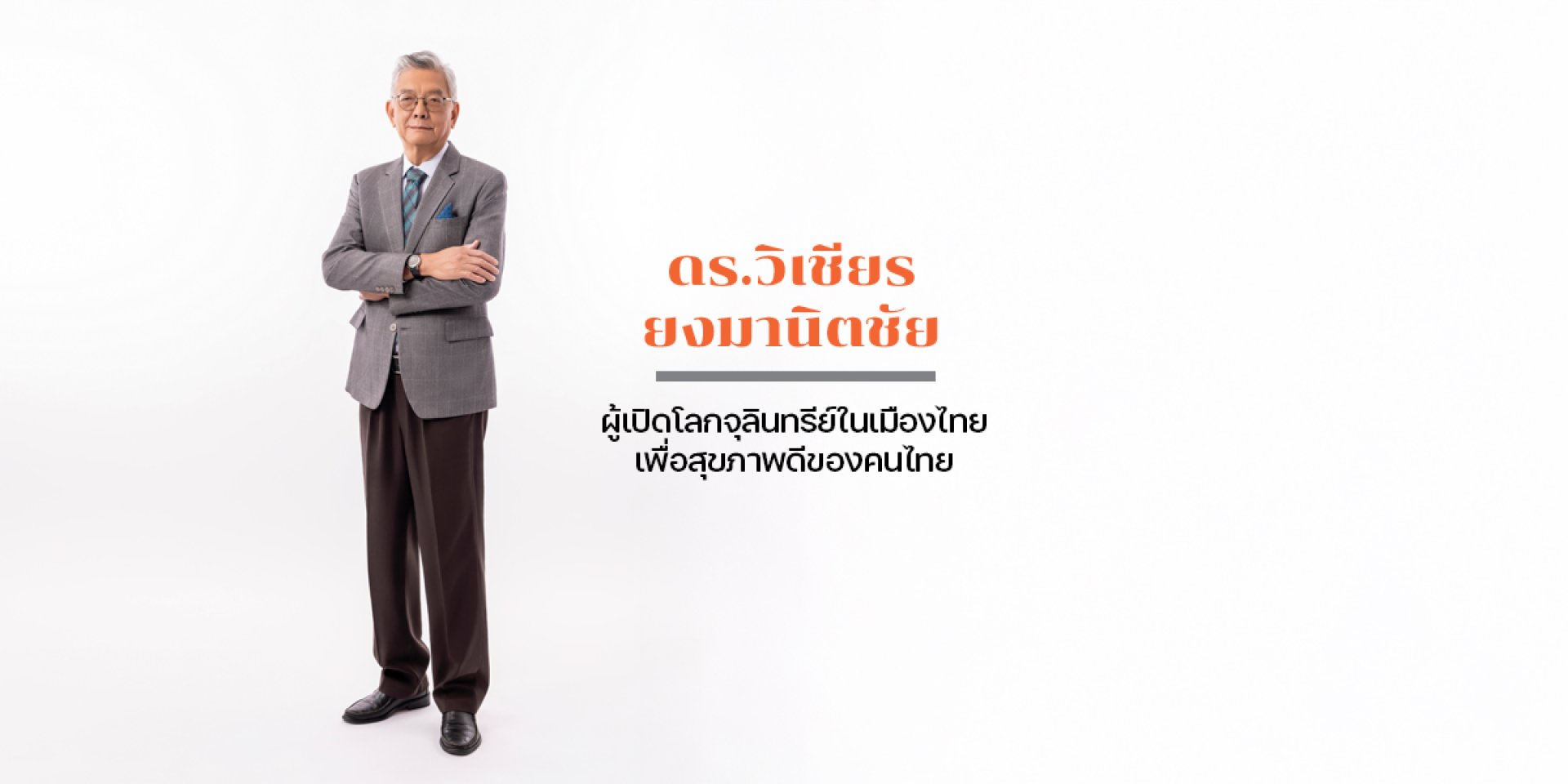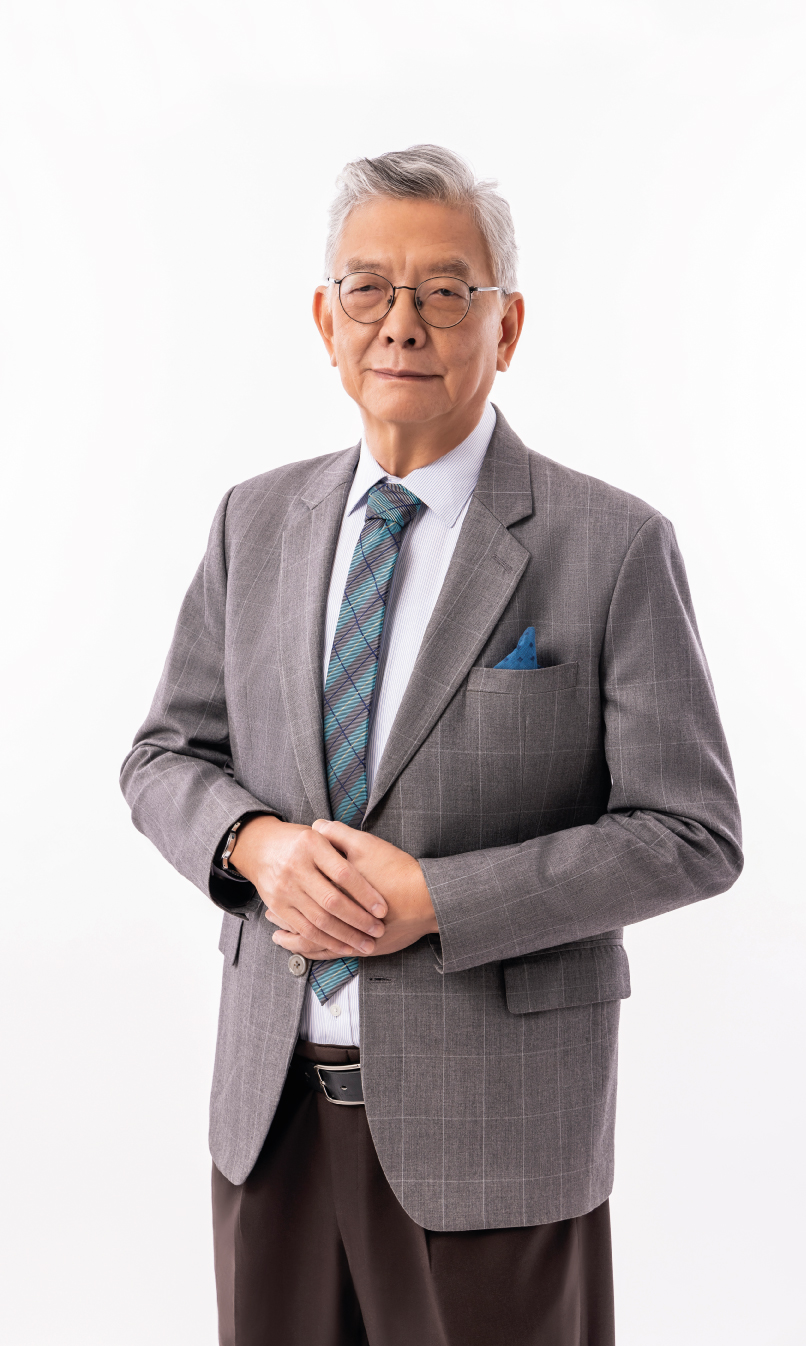ผู้เปิดโลกจุลินทรีย์ในเมืองไทย เพื่อสุขภาพดีของคนไทย โดย ดร.วิเชียร ยงมานิต

Dr. Wichian Yongmanitchai
A Pioneer of Microbial Biotechnology in Thailand for the Health and Well-being of Thai People
When it comes to experts in microbial biotechnology in Thailand, one internationally renowned scholar who comes to mind is Dr. Wichian Yongmanitchai, Director and Product Research & Development Manager at Siam Agri Supply Co., Ltd. (SAS).
Dr. Wichian has been a trailblazer since childhood, possessing profound, captivating, and multidimensional knowledge in the field of microorganisms.
I completed my Bachelor of Science in Agriculture at Kasetsart University in 1974, pursued a masters degree in Food Technology at Mysore University, India, and earned another masters degree in Community Health Nutrition at the University of Queensland, Australia. Finally, I obtained my Ph.D. in Biotechnology from the University of Waterloo, Canada. My expertise has thus consistently been in food and biotechnology from undergraduate to doctoral levels.
Thailands Microbial Bank by SAS
When the executives of SAS invited Dr. Wichian to serve as a consultant, he supported and advanced microbial biotechnology at a time when it was gaining attention. Numerous research studies were subsequently published.
The first objective at SAS was to produce probiotic microorganisms for economic animals such as pigs, chickens, and shrimp. This process required strict adherence to laws, as the Ministry of Agriculture and Cooperatives oversees this area. Legally, about 40-50 types of microorganisms are approved as probiotics, with a significant number being Bacillus speciesnearly 10 types. Thus, SAS confidently used Bacillus strains as the foundation for production.
The second challenge was determining where to obtain these strains. The correct and ethical approach involved collecting microorganisms from natural sources. Thailand, being a tropical country, is renowned for its rich microbial diversity; however, little research has been conducted on utilizing these microorganisms.
Therefore, Dr. Wichian and his team collected microorganisms from their natural habitats. Bacillus species are often found in fermented foods. One such Asian fermented food is "Thua Nao" (fermented soybean), which led the team to Northern Thailands provinces and even across the border into Myanmar, where cultural eating practices are similar. They collected samples and isolated pure strains using microbiological methods.
Once the pure strains were isolated, DNA analysis was conducted to identify their classification. DNA data was sent to the United States to compare global databases for species identification. Once identified, the strains were stored in SAS's Microbial Bank.
Dr. Wichian also collected microbial strains from fermented foods in Japan, Korea, and Taiwan. Comparative tests revealed that Thai strains exhibited superior digestive efficiency.
Today, SAS's Microbial Bank houses two main groups of strains: Bacillus and Lactobacillus.
Bacillus : The Powerhouse Microbe for Digestion
Dr. Wichian explained the properties of Bacillus strains:
Bacillus microorganisms excel at digesting organic matter, including food waste. They can also eliminate odors. SAS developed microbial products to treat wastewater in households and industrial factories, addressing complaints about foul-smelling wastewater caused by accumulated fats. SAS teams deployed these microorganisms to pig farms with odor issues. Initial results showed odor reduction within two days, with complete elimination in four days. This solution expanded from private farms to thousands of networked farms.
One of SASs proud projects involves using Bacillus for agricultural purposes to decompose plant and animal residues into organic matter, reducing chemical fertilizer usage. This technology also helps soften rice straw for easier plowing, enabling farmers to maintain their cropping schedule.
Three years ago, SAS initiated a project in organic rice fields in Tha Yang District, Phetchaburi Province. By applying microorganisms to break down leftover rice straw, farmers achieved 5% higher yields.
A particularly promising Bacillus strain can reduce methane gas, contributing to the reduction of greenhouse gases. If methane emissions can be lowered by even 2-3%, it would significantly impact carbon credits. Thailand, having committed to the Paris Agreement on climate change, will showcase its achievements by 2030, including contributions like these microbial innovations.
Dr. Wichian described ongoing efforts to find new microbial strains that accelerate straw decomposition while minimizing methane production. For this research, he collected samples from elephant dung in Northern elephant camps, emphasizing how environmental conditions guide strain selection.
SAS also collaborates with RAIN (Regional Agriculture Innovation Network), a U.S. Department of Agriculture-supported non-profit organization, to promote innovations that reduce rice straw burninga major contributor to PM2.5 air pollution. One of RAINs products, Soil Digest, effectively decomposes rice straw after harvest, improving soil organic matter and reducing burning.
In early October, RAIN organized a seminar addressing the burning issue. While other participants avoided discussing microorganisms, Dr. Wichian highlighted the role of microbes in rice straw decomposition. Over 200 attendees engaged in discussions lasting over three hours, leading organizations like the Khao Khwan Foundation and the Chaipattana Foundation to express interest in collaborating and scaling the project nationwide.

Lactobacillus Probiotics: Fresh Thai Strains for Health
In addition to Bacillus strains, Lactobacillus microorganisms in SAS's Microbial Bank provide health benefits for humans and animals. For humans, probiotics are regulated by the Food and Drug Administration (FDA), which approves specific strains. While Bacillus strains are less common for humans, Lactobacillus is prevalent.
SAS conducted extensive sampling of fermented, sour-tasting foods across ThailandNorth, Northeast, and Southto isolate and identify new Lactobacillus strains. These strains were then stored in SAS's Microbial Bank.
Dr. Wichian explained that producing human probiotics requires strict adherence to FDA standards. Initially, SAS imported probiotics from Japan and Korea. Eventually, SAS decided to establish its own probiotic production facility to ensure freshness, quality control, and affordability.
The facility, inspected and approved by the FDA after over a year, allows SAS to produce probiotics from its proprietary strainsvalidated by DNA evidence from its Microbial Bank.
Simplifying Technology for All
Dr. Wichians philosophy emphasizes accessibility and simplicity:
When conducting research, I aim to simplify processes. While some facilities invest hundreds of millions in large-scale fermentation equipment, we achieve the same microbial quality with smaller machinery. By producing just enough to meet demand, we control freshness, quality, and costs, ensuring that everyone can afford these products.
Thai Microbes for Thai Environments
Dr. Wichian concluded by highlighting the unique advantage of Thai microbial strains:
Microorganisms collected in Thailand are naturally adapted to the Thai environment, making them ideal for applications in human, animal, and environmental health.
Globally, scientists may have more advanced technologies than I do, but what sets me apart is my ability to adapt these technologies to Thailands contextto benefit ordinary people in ways they can afford.
The field of microbial biotechnology must continually advance. We know very little about the microorganisms on this planet. Research must continue to discover better and more effective solutions, which my team and I are committed to pursuing.


